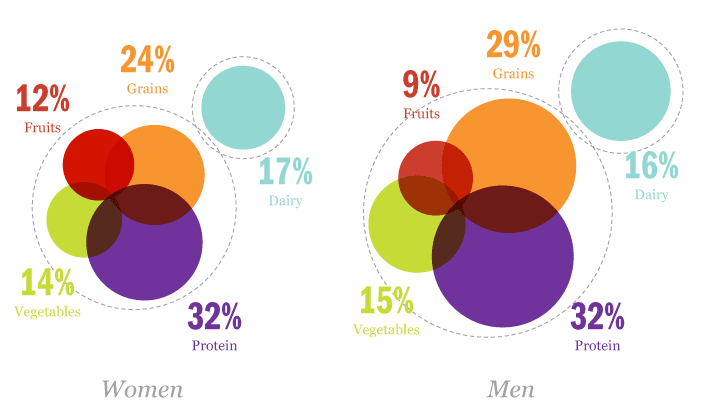While talking about optimal Nutritional Needs differences among Sexes, they have been elaborated by a variety of varying reproductive functions, Metabolic Rates and Body Structures. Although women and men have more than 90% identical DNA, their needs differ in many aspects.

Most women have less muscle mass than men which make them require fewer calories than men. According to the FDA guidelines, an estimated caloric intake for women ranges from 1600-2400 per day while men fall for 2000-3000 per day.
Considering macro and Micro Nutrients as well, the answer to the query “Do Women Have Different Nutritional Needs Than Men?” is a big YES!
Why Do Women Have Different Nutritional Needs?
Women have different requirements due to a lot of reasons. The more apparent ones are Menstruation, Pregnancy and Lactation. The amount and quality of both macro and micronutrients a woman needs are to increase the support to themselves as well as to the growing infant.
On the other hand, more differences are related to body physiology that differs from men. Women are at high risk for Osteoporosis, Anemia and Diabetes due to hormonal regulation.
Weight control tendency also fluctuates in women mostly at menopause than men, obviously due to regulative reproductive differentiation.
In this article below, we are going to discuss how women have different yet unique nutritional needs.
So, looking for some beneficial Information to make sure women are getting the perfect nutrients they need?
Let’s roll it!
Carbohydrates
According to the Healthy Eating Plate published by Harvard Medical School, the recommended carbohydrate portion should make up at least 50% of the total caloric intake for both sexes.

However, another 12 years of case study by the Harvard School of Public Health have found a clear link between low moods and a high level of refined grains in the diet of women. Thus, it is recommended to avoid refined grains such as pasta as a high amount for consumption by females.
Moreover, women who have a high amount of refined grains in their meals than whole grains are likely to suffer more from mood swings and depression. The suggested link can be of fluctuating levels of estrogen and blood sugar which can impact moods.
Men don’t get affected by this physiology. The mechanism is not yet fully understood. However, it is recommended to have vegetables with carbohydrates as fiber is believed to dampen the overall glucose response.
Benefits of low glycemic index food include:
- Less fatigue
- Mood stabilization
- Reduced insulin resistance
- Stable blood sugar
- Fewer hunger pangs
Essential fatty acids
Omega-3 and omega-6 fatty acids are known as essential polyunsaturated fatty acids. They are beneficial in increasing good cholesterol, reducing triglycerides and maintaining useful brain function. They also prevent blood clotting in vessels by acting as anticoagulants.
They are required in almost an equal amount in both sexes. However, it functions differently for both. Women need all 3 EFA for fetus development and breastfeeding, known as;
- Alpha-linoleic acid (ALA)
- Eicosapentaenoic acid (EPA)
- Docosahexaenoic acid (DHA)
Omega-3 and omega-6 is proven to prevent breast cancer while improving the quality of the female reproductive system. Their levels are highly required in puberty and menopause duration as well.
Proteins
Women require the fewer amount of proteins than men. The reason is the variation of muscle mass in both genders. Extra protein may accelerate calcium loss in urine because of the acid breakdown. Hence, women eating an excessive amount of protein can have a high risk of developing osteoporosis.
Some more pitfalls of amino acid overeating can include; high uric acid blood levels, dehydration & kidney overload.
Protein is also essential for beautification as it is an integral part of your skin, hair and nails. An average requirement of protein is around 0.8 grams per kg of the body weight. If you are an athlete, then your protein requirements may increase according to your intensity of activity.
Micronutrients
As we already mentioned above, women need more calcium to prevent Osteoporosis. On average, women have a lower bone mineral mass and density than men and they lose one mass rapidly. Also, menopause is a loss of estrogen which aids the strengthening of bones.
Ideally, Women need 700mg of calcium along with 400IU vitamin D per day. Post-menopausal women are recommended to take 1200mg of calcium daily to counter the estrogen deficiency.

Females pump up with iron. Prior to menopause, women also need to get sufficient iron as it declines with each cycle. Furthermore, a compound like folic acid is proved to balance the health of ovaries which acts as a must-have nutrient in females than males. Cocoa is surprisingly beneficial to improve platelets function in women and is linked to minimizing the risk of strokes and heart attacks as well.
The recommended daily intake of folic acid is 400 micrograms, and 30mg – 60 mg iron is per day in women. (WHO)
Zinc is another mineral which is required more in males because it contributes to aid the immune system and healthy production of sperms. Male reproductive hormones also Nutritional Needs zinc for synthesis; in contrast with females, zinc is only required for immunity and cell function. High protein foods such as shellfish are rich in zinc.
Women require 7mg of zinc, while men need 9.5mg per day.
Magnesium is vital to relieve muscular cramps and other symptoms of premenstrual syndrome in females. It is also found to regulate glucose for diabetes prevention and aids in calcium regulation in all ages. In men, magnesium helps to regulate nerve function along with enzymatic regulation, thus preventing fatigue. Requirements may be high in males; however, needs are more critical in females.
Average daily magnesium intake is 310mg in females while 400mg per day in males. Magnesium requirements increase with an increase in age.
Benefits Of Vitamins

Benefits Of Minerals

Fiber
A high fiber diet has exceptional health benefits despite gender. It has been identified as an essential part of the daily diet by the FDA. Fiber is a natural plant product known to lower the glycemic index of foods, promotes digestion, and helps to reduce bad fats in the body.
In women, fiber is beneficial for many reasons. It reduces the risk of colon cancer, breast cancer, cardiovascular disease, diabetes and obesity. You can also buy research papers for more clarification on the topic.
The recommended daily intake for a 2000 calorie diet is 25 grams per day.
Therefore, this must be a minimum. However, a large amount can cause diarrhea, bloating and stomach cramps. Increase in the amount of fiber in your diet should be done gradually and must be distributed in acceptable quantities throughout snacks and meals.
Also, it is best to take plenty of water with fiber to make the stomach feel full for a more extended period. Satiety can be achieved quickly, and it will cleanse your digestive tract and regulate bowels.
In short, a high fiber diet can bring unlimited advantages in women, including:
- Prevents heart disease
- Prevents constipation
- Decreases colon cancer risk
- Helps prevent obesity
- Helps with satiety
- Helps prevent stroke
- Decreases breast cancer risk
- Prevents diverticulosis
- Decreases cholesterol levels
- Prevents hypertension
- Prevents and manages diabetes
Bonus: Tips To Boost Fertility With Nutrients!
If you are planning to get pregnant, then taking folate is just not sufficient. It would be best if you consider the tips below for a healthy nine months of motherhood and a healthy baby.
- Take a prenatal supplement that has all fertility Nutritional Needs, including vitamin-E, vitamin-C, zinc, folic acid, and omega fatty acids.
- Avoid caffeine, alcohol, and nicotine as all of them are proven to reduce fertility.
- Eat more organic foods, free-range meat and poultry to limit pesticides and pollutants.
- Please do not overlook your partner’s diet. Most fertility problems can contribute from men, thus encourage them to take supplements of vitamins and minerals for a healthy sperm count.
Conclusion
Since females have less muscle mass and more body fat than men, they need comparatively fewer calories to maintain a healthy activity level and balanced body weight. However, women who are physically more active may need more calories and more Nutritional Needs.
Along with everyday routine, physical activity is essential for better hormonal regulation and stress management. A balanced diet that is rich in micronutrients and balanced in macronutrients is ideal for complete nutrition.
Lastly, advice to some fine points of Nutritional Needs of both sexes is worth adhering and addressing if you are keen to keep an active and healthy lifestyle.
Stay healthy stay happy!











